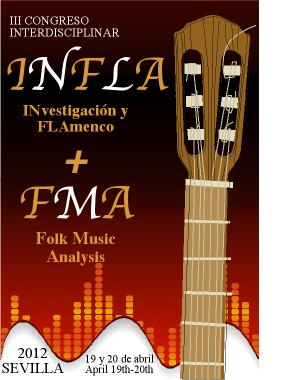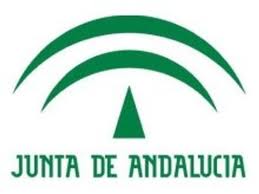| |
19th of April |
| |
8:00 h.: |
Conference registration
Payment can be made through bank transfer (before April 10th) or in cash at the conference (April 19th).
|
| |
9:00 h.: |
Welcome
and opening speech |
|
9:30 h.: |
Session 1
Cristina Cruces: Hacia una revisión del concepto “nuevo flamenco”. La intelectualización del arte.
Guillermo Castro Buendía: El Romance de La loba parda y la Bulería corta de Jerez.
Juan Zagalaz: Flamenco - Jazz: una perspectiva analítica de sus orígenes.
Inmaculada Marqués, José-Miguel Díaz-Báñez y Joaquín Mora: El canto (cante) al Cristo de la Cárcel en Mairena del Alcor.
|
|
11:00 h.: |
Coffee break |
|
11:30 h.: |
Session 2
Maria Del Carmen López Castro: Estudio de métodos para la transcripción y el análisis del piano flamenco.
Antonio Bonilla Roquero: El zapateado flamenco: naturaleza formal y señas de identidad.
Marco Antonio De La Ossa Martínez: Federico García Lorca y la música: el flamenco y la música tradicional.
Inés María Luna López: El flamenco como expresión de lo sublime: la colección de cantes flamencos de Antonio Machado y Álvarez.
|
|
13:00 h.: |
Lunch and coffee |
|
14:30 h.: |
Session 3
Miguel A. Berlanga: Nuevas propuestas para la historia del baile flamenco.
Gabriela Estrada: El legado de Félix Fernández García en el desarrollo del ballet y la danza española.
García Sánchez María Jesús:¿Tradición o renovación? Un estudio del flamenco de Antonio Chacón y Enrique Morente.
Antonio Mandly y Francisco Manuel Llorente: Flamenco, juegos de lenguaje y tecnologías de la comunicación.
|
|
16:00 h.: |
Coffee break |
|
16:30 h.: |
Session 4
Benjamín Perea Díaz: La audición de flamenco en los más pequeños.
Emilia Navarrón, Carlos Sepúlveda y Carmen Naranjo: Estrategias didácticas para el uso del flamenco como vehiculo de participación social en personas con trastorno mental.
Jaime Trancoso González: Arturo Pavón, el pianista flamenco acompañante.
|
| |
18:00 h.: |
Short presentation session
Speakers: Eva Ordoñez, Carmen M. González, Antonio Cremades, Lucía Ballesteros, Sheila del Barrio, Pedro J. Millán, Miguelina Cabral, Paula P. Marchena, Antonio J. Pradel.
|
|
19.30 h.: |
Conference-concert: Sobre la evolución de los cantes flamencos, by Calixto Sánchez accompanied by Eduardo Rebollar.
(On the evolution of flamenco singing styles; in Spanish)
|
| |
|
| |
20th of April
|
|
9:30
h.: |
Welcome
and registration |
|
10:00
h. - 11:00 h. |
FMA Session 1: Pitch content description
- 10:00: Joren Six and Olmo Cornelis. A Robust Audio Fingerprinter Based on Pitch Class Histograms - Applications for Ethnic Music Archives.
Abstract: In this paper we present a new acoustic fingerprinting system, based on pitch class histograms. The
aim of acoustic fingerprinting is to generate a small representation of an audio signal that can be used
to identify identical, or recognize similar, audio snippets in a large audio set. A robust fingerprinting
system generates similar fingerprints for perceptually similar audio signals. A piece of music with
a noise added should generate an almost identical fingerprint as the original. The new system,
presented here, has some interesting features which makes it a valuable tool to manage ethnic music
archives: the fingerprints are rather robust against pitch shift, tempo changes, several synthetic audio
effects, and reversal of the audio. When only part of the audio is used to generate a fingerprint, the
system keeps working but retrieval performance degrades.
- 10:30: Emilia Gómez, Jordi Bonada and Justin Salamon. Automatic Transcription of Flamenco Singing from Monophonic and Polyphonic Music Recordings.
Abstract: We propose a method for the automatic transcription of flamenco singing from monophonic and polyphonic
music recordings. Our transcription system is based on estimating the fundamental frequency (f0) of the
singing voice, and follows an iterative strategy for note segmentation and labelling. The generated
transcriptions are used in the context of melodic similarity, style classification and pattern detection. In our
study, we discuss the difficulties found in transcribing flamenco singing and in evaluating the obtained
transcriptions, we analyze the influence of the different steps of the algorithm, and we state the main
limitations of our approach and discuss the challenges for future studies.
|
|
11:00
h.: |
Coffee break |
|
11:30
h. - 13:00 h. |
FMA Session 2: Motive analysis
- 11:30: Olivier Lartillot. Prolongational Syntagmatic Network, and its Use in Modal and Motivic Analyses of Maqam Improvisation.
Abstract: In this paper is defined a concept of Retentional Syntagmatic Network (RSN), which models the
connectivity between temporally closed notes. The RSN formalizes the Schenkerian notion of pitch
prolongation as a concept of syntagmatic retention, whose characteristics are dependent on the un-
derlying modal context. This framework enables to formalize the syntagmatic role of ornamentation,
and allows an automation of motivic analysis that takes into account melodic transformations. The
model is applied to the analysis of a maqam improvisation. The RSN is also proposed as a way to
surpass strict hierarchical segmentation models, which in our view cannot sufficiently describe the
richness of musical structure. Instead of separability, we propose to focus instead on the connectivity
between notes, modeled with the help of RSNs.
- 12:00: Darrell Conklin. Antipattern discovery in Basque folk tunes.
Abstract: This paper presents a new pattern discovery method for labelled folk song corpora. The method
discovers general patterns that are rare or even entirely absent in a corpus, and among those the ones
that are the most general or frequent in the background set. The method is applied to two parallel
ontologies of a large corpus of Basque folk tunes.
- 12:30: Paco Gomez, Aggelos Pikrakis, Joaquin Mora, Jose Miguel Diaz-Bañez, Emilia Gomez, Francisco Escobar, Sergio Oramas and Justin Salamon. Automatic Detection of Melodic Patterns in Flamenco Singing by Analyzing Polyphonic Music Recordings.
Abstract: In this work an analysis of characteristic melodic pattern in flamenco fandango style is carried out.
Contrary to other analysis, where corpora are searched for characteristic melodic patterns, in this
work characteristic melodic patterns are defined by flamenco experts and then searched in the cor-
pora. In our case, the corpora were composed of pieces taken from two fandango styles, Valverde
fandangos and Huelva capital fandangos. The chosen styles are representative of fandango styles
and are also different as for their musical characteristics. The patterns provided by the flamenco
experts were specified in MIDI format, but the corpora under study were provided in audio format.
Two algorithms had to be designed to accomplish the goal of our research: first, an algorithm ex-
tracting audio features from the corpus and outputting a MIDI-like format; second, an algorithm to
actually perform the search based on the output provided by the first algorithm. Flamenco experts
assessed the results of the searches and drew conclusions.
|
|
13.00
h.: |
Lunch and coffee |
|
14:30
h.: |
Panel discussion: Technological challenges for the computational modeling of the world's musical heritage. This event is sponsored by MIReS and organized by Polina Proutskova, Goldsmiths, University of London and Emilia Gómez, Universitat Pompeu Fabra |
|
16:00
h.: |
Coffee
break |
|
16:30
h. - 17:30 h. |
FMA Session 3: Singing
- 16:30: Polina Proutskova. Does singing style correlate to social behaviour? - a revision of the Cantometric descriptor vocal tension and its correlation to the subordination of women in society.
Abstract: This is a presentation of work-in-progress for the FMA conference 2012 in Seville. The project described in
this article is concerned with the Cantometric descriptor vocal width or vocal tension. This vocal quality was
shown to correlate with subordination of women in the society by Alan Lomax and the Cantometrics team. In
the current project the choice of this aspect of Cantometric parametrisation is put under scrutiny. Methods for
automated extraction of the relevant vocal production qualities are investigated with the goal to reproduce or
refute Cantometrics' findings using new data and avoiding the subjectivity of manual rating. Inverse filtering
is identified as a possible approach for semi-automatic detection of phonation modes and ways to automate it
are discussed.
- 17:00: J. Salamon, E. Gómez, B. Rocha, S. Gulati and X. Serra. Predominant and Multipitch Estimation from Polyphonic Audio Signals: Applications in Folk Music Analysis.
Abstract:
In this talk we present some applications of predominant and multipitch estimation to folk music analysis. We start by presenting a state-of-the-art predominant melody extraction algorithm, which estimates the fundamental frequency of the predominant melodic line of a polyphonic piece of music. We then describe its application to genre classification, flamenco singing transcription and motif detection. Finally, we explain how the algorithm is modified to provide a multipitch representation which is used for tonic identification in Indian classical music.
|
|
17:30
h.: |
Wrap-up session |
|
18:30
h.: |
Flamenco concert:
Antonio Bonilla and Guillermo Ligero (flamenco guitar professors at the Conservatory).
Acompaniment by:
Raquel Cabello (cante),
María Pilar López (dance) y
Paco Vega (percussion).
|





